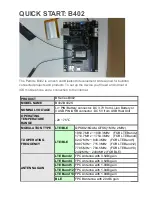BAT32G1x9 user manual | Chapter 6 Universal timer unit Timer4/8
148 / 1149
Rev.1.02
6.3.2
Timer clock selection register m (TPSm).
The TPSm registers are 16-bit registers that can be supplied to each channel with 2 or 4 common operating
clocks (CKm0, CKm1, CKm2,CKm3). Select CKm0 by bit3~0 of the TPSm register and CKm1 by bit7~4 of the TPSm
register. In addition, only channels 1 and 3 can select CKm2 and CKm3, via bit9~8 of the TPSm register to Select
CKm2, selected by bit13 and bit12 of the TPSm register CKm3
。
The TPSm register in timer operation can only be overwritten in the following cases.
the case of PRSm00~PRSm03 bits can be rewritten (when m=0: n=0~3, m=1: n=0~7):
Channels that select CKm0 as the running clock (CKSmn1, CKSmn0=0, 0) are all in the stopped state
(TEmn=0).
the case of PRSm10~PRSm13 bits can be rewritten (when m=0: n=0~3, m=1: n=0~7):
Channels selecting CKm2 as the operating clock (CKSmn1, CKSmn0=0, 1) are all in the stopped state
(TEmn=0).
Cases where PRSm20 bits and PRSm21 bits can be rewritten (n=1, 3):
Channels that select CKm1 as the operating clock (CKSmn1, CKSmn0=1, 0) are all in the stopped state
(TEmn=0).
Cases where PRSm30 bits and PRSm31 bits can be rewritten (n=1, 3):
Channels selecting CKm3 as the operating clock (CKSmn1, CKSmn0=1, 1) are all in the stopped state
(TEmn=0).
The TPSm register is set by the 16-bit memory operation instruction. After generating a reset signal, the value
of the TPSm register changes to "0000H".


















